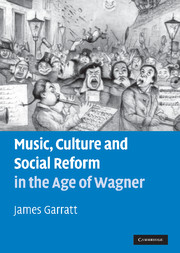Book contents
- Frontmatter
- Contents
- Acknowledgments
- Abbreviations
- Introduction
- 1 Liberalism, autonomy and the social functions of art
- 2 Radical and social aesthetics in the Vormärz
- 3 Speaking for the Volk: music, politics and Vormärz festivals
- 4 Revolutionary voices: blueprints for an aesthetic state
- 5 Music and the politics of post-revolutionary culture
- 6 The song of the workers: idylls and activism
- Notes
- Bibliography
- Index
5 - Music and the politics of post-revolutionary culture
Published online by Cambridge University Press: 05 July 2011
- Frontmatter
- Contents
- Acknowledgments
- Abbreviations
- Introduction
- 1 Liberalism, autonomy and the social functions of art
- 2 Radical and social aesthetics in the Vormärz
- 3 Speaking for the Volk: music, politics and Vormärz festivals
- 4 Revolutionary voices: blueprints for an aesthetic state
- 5 Music and the politics of post-revolutionary culture
- 6 The song of the workers: idylls and activism
- Notes
- Bibliography
- Index
Summary
The rapid collapse of the 1848–9 revolution was a double blow for German progressives. As well as frustrating their hopes of immediate change, it undermined the foundations of emancipatory politics, making the cherished principles of half a century's political and social theory appear irretrievably compromised. In particular, the impotence of the Frankfurt Assembly led radicals to reject parliamentary politics and liberals to collapse into inertia and despondency. More broadly, the Assembly came to symbolize the limitations of rational debate, and the bankruptcy of idealistic slogans and abstractions. In addition, whether repelled by popular violence or disappointed by the apathy of the majority, it was clear to many progressives that existing projects for popular education and cultivation through art had failed to create a civically minded populace. These factors, together with the familiar image of the post-revolutionary years as an age of pessimism, might lead us to expect that they were a barren ground for social art and social aesthetics. Certainly, many artists, writers and musicians – despondent and cynical – shrank back from their earlier ideals, rejecting the politicized art of the Vormärz and revolution as well as questioning the notion that art could help transform society. Yet this response was by no means universal. Rather than succumbing to pessimism, many artists and commentators stubbornly clung to their revolutionary standpoints; still more strove to redefine the social functions of art in the wake of 1848–9, aiming to ensure that the renewal of art and society remained reciprocal projects.
- Type
- Chapter
- Information
- Music, Culture and Social Reform in the Age of Wagner , pp. 156 - 196Publisher: Cambridge University PressPrint publication year: 2010



